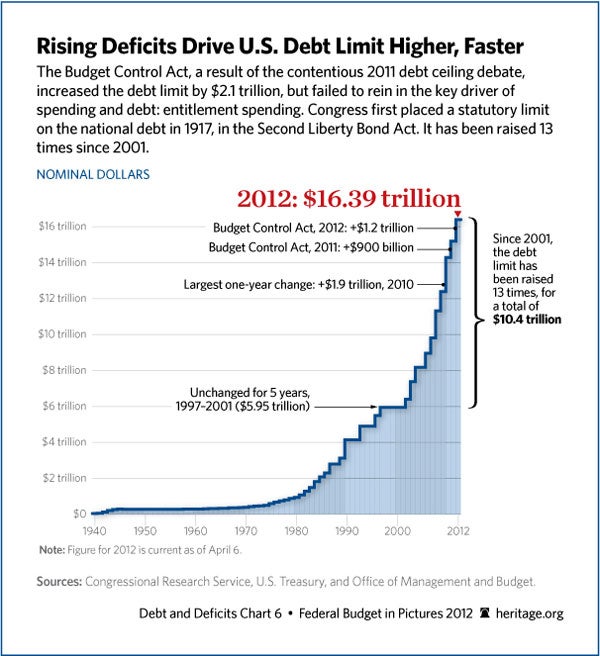Morning Bell: $16,000,000,000,000
Amy Payne /
Yesterday, the U.S. national debt passed $16 trillion. On President Barack Obama’s watch, the debt has increased by 50 percent, as campaign promise after campaign promise has drowned in a sea of federal spending.
When he was running for President, Obama condemned George W. Bush for adding $4 trillion to the national debt over eight years, calling it “irresponsible” and “unpatriotic.” Now—in less than four years—Obama’s Administration has already added almost $6 trillion to the debt. That means he is on track to triple Bush’s debt increase over eight years.
It is important to understand the magnitude of this debt increase and what it means for the country. Several terms are often used to describe the debt, but they are not interchangeable. Here is a quick guide to the U.S. debt.
National debt or “gross debt,” which just passed $16 trillion: This includes what we think of as federal debt plus intergovernmental debt—money the U.S. government has loaned itself from one part of the budget to another. An example of intergovernmental debt is transfers from the general fund to Social Security.
- The “debt ceiling” applies to this measure of the debt. At this rate, it will hit the ceiling again—meaning Congress will have to act and will likely raise the limit again—perhaps as early as November of this year.
- At $16 trillion, this number has passed total U.S. gross domestic product (GDP), the measure of all that is produced in the economy.
- Since Obama took office, the national debt has increased from about $10.6 trillion to more than $16 trillion—a 50 percent increase.
- Debt per taxpayer: $111,414 and counting
Publicly held debt or “debt held by the public,” which stands at about $11.3 trillion: The debt held by the public is publicly traded debt, so it can be bought and sold in the credit markets. It does not include the intergovernmental loans mentioned above.
- Since Obama took office, publicly held debt has increased from about $6.3 trillion to about $11.3 trillion—a nearly 80 percent increase.
- This total—and the 80 percent increase—is actually more significant, because President Obama has added more to the publicly held debt than any previous President.
The federal budget deficit, which is on track to top $1 trillion for the fourth straight year: The deficit shows how much government spending has exceeded revenue in a given year, or the money the government is taking in from taxes. In contrast, the publicly held debt is the total of all past deficits and surpluses. The U.S. government spends more than it takes in. To cover the deficit and continue spending, government bonds and notes—essentially IOUs—must be issued.
- President Obama vowed to cut the deficit in half by the end of his first term.
- Instead, Obama has averaged deficits nearly three times that of his predecessor.
These numbers are staggering. In just a few years, the U.S. will be spending more on just the interest on the national debt than on our entire national defense budget. As Heritage’s Romina Boccia explains:
Countries like Greece and Italy demonstrate the economic pains that result from procrastinating on solving a nation’s major spending and debt challenges. Only Congress can decide whether to make the prudent and intentional decisions to ward off a fiscal crisis, or whether to stand idle until forced to act by unnecessarily painful events that could have been avoided.
As it is, children born in the United States today—who won’t pay taxes for years yet—are saddled with a more than $50,000 share of the national debt. If Congress and the President refuse to rein in spending, these children may grow up in the new Greece.
Research Associate Emily Goff contributed to the preparation of this article.
Quick Hits:
- A video at the Democratic National Convention declared that “government is the only thing we all belong to.”
- The new Democratic Party platform endorses abortion “regardless of ability to pay,” meaning an endorsement of taxpayer-funded abortions.
- Other changes to the Democratic Party platform include removing mentions of God and of Jerusalem as the capital of Israel.
- “A new United Nations nuclear watchdog report on Iran’s nuclear program reveals Tehran is moving ahead with illicit uranium enrichment work, undermining Obama administration claims that sanctions will slow the program,” reports the Washington Free Beacon.
- The U.N.’s Arms Trade Treaty may have been sidelined, but it is working on another agreement that explicitly promotes gun control.

